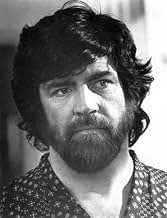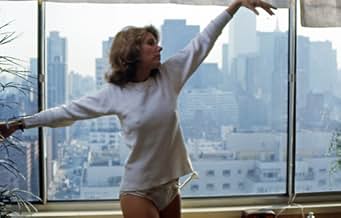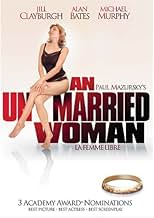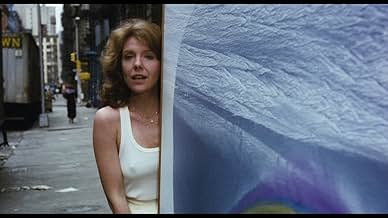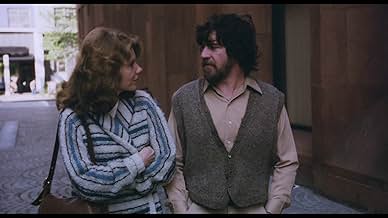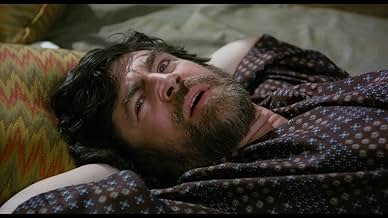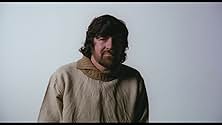Une femme riche de l'Upper East Side de Manhattan doit faire face à sa nouvelle identité et à sa sexualité après que son mari depuis 16 ans l'a quittée pour une femme plus jeune.Une femme riche de l'Upper East Side de Manhattan doit faire face à sa nouvelle identité et à sa sexualité après que son mari depuis 16 ans l'a quittée pour une femme plus jeune.Une femme riche de l'Upper East Side de Manhattan doit faire face à sa nouvelle identité et à sa sexualité après que son mari depuis 16 ans l'a quittée pour une femme plus jeune.
- Réalisation
- Scénario
- Casting principal
- Nommé pour 3 Oscars
- 6 victoires et 18 nominations au total
- Sue
- (as Pat Quinn)
- Cabbie
- (as Chico Martinez)
Avis à la une
This movie was made when divorce was still a hot topic and women were just coming into the workforce and still tied into identifying themselves through marriage. But the film is still relevant today (we all deal with rejection of one sort or another). The rest of the cast is superb and there are great shots of New York circa 1978.
Ten stars.
The mid to late 70s was New York's era as the 'fashionable city' in the days of fashionable cities. NYC took the torch from Swinging Sixites London as the city every fashionable person wanted to go to, live in, know... It was the 'Disco' capital of the world. It was where the most interesting films were set. It where all the happening artists lived and Unmarried Woman caught the zeitgeist of that time. Even jogging was a new phenomenon back then and NY lead the way with it and 'everyone' wanted to know what people were up to there, even about the jogging. If you'd never been to NYC you were missing out. If you had been to NY and or knew NY, back in 1978, you bragged about it. While at the same time the city was officially broke and in many ways seemed to be crumbling into the sea.
Unmarried Woman was a product of all this fascination, both negative and positive, with the city at the time. Trivial details about life in NY had a sort of cachet. Therefore, on reflection, what may seem trite to viewers today, had a strange sort of value back then.
Some people sneer at Erica's seemingly privileged position in society. How dare she be so miserable, have you seen where she lives? Well, guess what, wealthy women also feel sad when they are rejected by their husbands for a younger model. And guess what, some people like to look at the lives of people who live in beautiful apartments with views of the river and whizz downtown in yellow cabs on bright New York mornings. In fact it's the contrast between the material privilege and the sadness and loss that makes this film work.
Some people are also alarmed by the strong, upfront musical score. Sorry about that. Music in the 70s was strong and upfront in our lives, not just background noise. The wailing saxophone was the pop instrument of the time and the excellent, very 70s soundtrack, is one of the aspects that make watching this film such a powerful, nostalgic and enjoyable ride.
Unmarried Woman does have its flaws. It is at times somewhat simplistic and personally, I'm not so sure that newly unmarried woman, Erica, was as much of a catch as we're made to believe. Every man she meets seems to fall at her feet.
This is very much a film of its time and a very interesting time and place it was. I wish they still made films like this today, about adults, for adults, with strong subtle performances, without both eyes on the cash register and without some dreary, over-exposed, under talented box office 'star' drudging her way through her lines. There was something very adult and sophisticated about American cinema in the 70s and Unmarrried Woman takes its place in the long list of films that were a part of that.
The film was beautifully shot, beautifully scored, excellently acted and I'm glad it's now available for us to see, as a reminder of a short but memorable time and place.
WOMAN deals with Erica (Jill Clayburgh), a middle aged, middle class Manhattan housewife who suddenly discovers that her husband has fallen in love with a younger woman and wants a divorce. She responds with predictable anger and outrage, before settling down to the business of "surviving." Divorce is never easy, but as divorcees go, Erica has it awfully good. She is blessed with, in no particular order, a guilt-ridden ex-husband who churns out the checks; a supportive teenaged daughter, who apparently has little interest in her dad; an ad hoc support group made up of girlfriends who cheerfully share in male-bashing self-righteousness; and an indulgent female therapist adept at nodding her head in mechanical approval and dispensing dime-store encouragement. And when it comes time to get back into action, she has no trouble findings a couple of hunky guys, who, by the way, are artists, not boring old businessmen like her ex-hubby, Martin. In short, female bonding goes on all over the place and men are put in their place as convenient sex objects.
Indeed, divorce seems to be a blessing in disguise. Compared to the heroines of films like ALICE DOESN'T LIVE HERE ANYMORE or NORMA RAE, Erica seems to have it pretty darn good. And that is a major problem in the film: it is noticeably lacking drama. Had the film been played more for humor, then Erica's newfound awaking might have had a joyous kick. Instead, Mazursky labors to make serious, i.e., feminist statements about the travails of being a woman in contemporary America. But, boy did he pick the wrong woman to use as a poster child. Since Erica really doesn't have any discernible hardships in her life, the film falls back on the last refuge of feminist self-pity: self-esteem. AN UNMARRIED WOMAN is about Erica learning to feel good about herself. ZZZZZzzzzzzzz.....!
Maybe because I am a male, I found Erica's journey to self-awareness boring. Jill Clayburgh, who plays Erica, was the actress du jour of the era. She had the curious ability to seem sad even when she was happy and vulnerable even as she was being hard-bitten. Unfortunately, this is the way she came off whether the role required it or not. It is what the role of Erica required, but even so I have never found Clayburgh to be a particularly likable actress; she behaves like she is in the movies because she doesn't have a choice. She is not a giving actress. Erica seem perpetually annoyed that she even has to "survive" and Clayburgh acts as though she has something else she'd rather be doing.
Again, perhaps because I am a man, I found the relatively minor character of Erica's husband to be more compelling and more complex. Played by Michael Murphy like an extension of his role in Woody Allen's MANHATTAN, Martin is a cliche -- a middle-aged man walking away from a comfortable marriage in search of something to revitalize his life -- but as cliches go, it is a valid one. Murphy gives a glimpse of a man in emotional and philosophical turmoil; it is a performance that vividly reveals more in a few short scenes than Clayburgh does with all of Erica's tiresome whining. We see why he wanted out of his marriage to Erica, but not why he'd want back in.
Mazursky is not a great director or a particularly skillful writer, but he is even worse as an editor. He has no sense of pace and loves to let scenes ramble far beyond their point of impact. But in his best films, such as BOB & CAROL & TED & ALICE, MOSCOW ON THE HUDSON and DOWN AND OUT IN BEVERLY HILLS he gently mocks self-absorbed, trendy twits. Here, instead of teasing the foibles of his New Yorker of choice, he embraces her. He wants us to know he understands feminine/feminist angst. In a strange way, AN UNMARRIED WOMAN is less about a woman or even women, than about a man trying to prove his liberal credentials by pandering to feminist stereotypes. As such, a film that strives to be realistic ends up being condescendingly phony.
The wonderful Paul Mazursky created this 1978 landmark slaute to women's liberation and the film wipes the floor with the messy urban horror of 1977's Looking for Mr. Goodbar: Goodbar's makers ultimately had no respect for their female protagonist but Mazursky scores in his depiction of female self-respect and love.
Jill Clayburg's miraculous performance as Erica was snubbed at the Academy Awards in favor of Jane Fonda's more 'tolerable' female in Coming Home but if you look closely you'll see there's no comparison and Clayburg hits all the right notes while displaying Erica's overwhelmingly complex feelings. Perhaps Erica's unique strength was too much for many male Academy members so they rewarded the typical moony-eyed housewife character instead. Regardless of that, Clayburg makes a brilliant lead and her lonely journey through New York-chic (art exhibits, bars, therapists, narcisstic artists) makes for great viewing. (The very brief encounters Erica has with a handsome blonde man at the coatcheck before and after she's been hit with the news from her husband are a nice touch!) There's a rare level of intimacy between the actors in all of the scenes but especially the girl group talks: the words sound surprisingly like they belong to the actors and Mazursky's ear for dialogue is sharp and refreshingly to-the-point.
Michael Murphy as the wayward husband, Alan Bates as the new love interest, and Cliff Gorman -whom I last saw as the bitchy, effeminate in The Boys in the Band!- as a male chauvinist provide exceptional support as the men in Erica's life. The only thing that marres the beauty of this film is its awful, piercingly shrill, '70's saxophone musical score.
Le saviez-vous
- AnecdotesDr. Penelope Russianoff, who plays Erica (Jill Clayburgh)'s therapist Tanya, was an actual practicing psychologist. The counseling sessions were filmed in her actual penthouse apartment on West 86th Street in New York, where she saw her patients. She worked for two and a half days and was paid US $2500. She was cast after having been recommended to director Paul Mazursky by "Girlfriends" (1978) director Claudia Weill. Russianoff said that she improvised most of her dialogue, which was based on the type of therapy she gave her patients. After the movie was launched, Russianoff became a mini-celebrity. She said the role gave her "instant celebrity-hood," being recognized on the streets of New York, where she signed autographs, and got a number of new clients. She wrote several self-help books in the 1980s, including "Why Do I Think I Am Nothing Without a Man?" (1988), a book first published about a decade after this film, but with a title and subject matter that were reflective of this picture.
- GaffesThe boom is clearly visible for several seconds during the art gallery scene.
- Citations
[first lines]
[Martin and Erica are jogging along the river]
Martin: Jesus Christ! Look at this! My sneaker's ruined!
Erica: They're only $35.
[Erica takes Martin's shoe and cleans it off for him]
Martin: Fucking city's turning into one big pile of DOG SHIT!
[shouting at passing traffic]
Martin: Come on out and take a crap on me--everybody else is. Fuck!
[Martin lights a cigarette]
Erica: ...been jogging for 2 1/2 miles - you're giving yourself lung cancer.
Martin: I'll tell you something, Erica: the longer I'm married to you, the more you sound like my mother.
Erica: Clean your own sneaker.
[throws shoe at Martin]
Martin: I think you wanted me to step in it.
Erica: [laughing] You're going crazy, Martin.
Martin: I am?
Erica: [laughing] Yes.
[Martin tosses his shoe over his shoulder into the river. Erica jogs away, and Martin jogs after]
- Crédits fousFor Betsy
- Bandes originalesSwan Lake, Op.20
(1877) (uncredited)
Written by Pyotr Ilyich Tchaikovsky
Excerpts danced by Jill Clayburgh
Meilleurs choix
- How long is An Unmarried Woman?Alimenté par Alexa
Détails
Box-office
- Montant brut aux États-Unis et au Canada
- 24 000 000 $US
Contribuer à cette page



